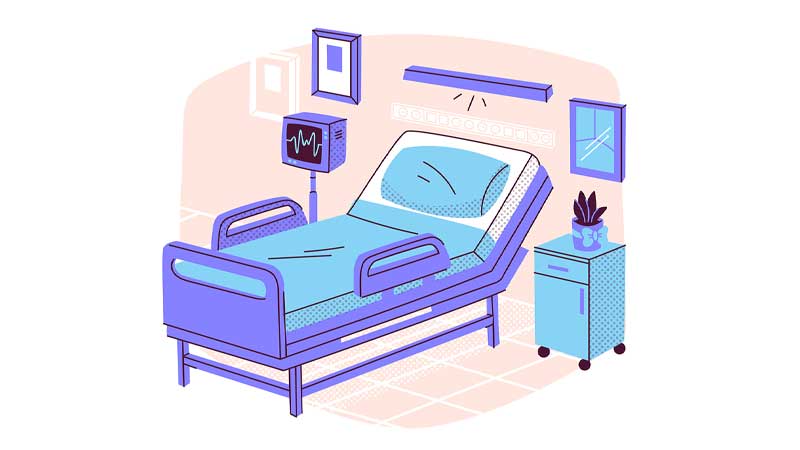A 2 crank hospital bed is an essential piece of medical equipment designed to enhance patient care and comfort in various healthcare settings. These beds provide manual adjustability through two separate cranks, allowing caregivers to modify the height and positioning of the bed to suit individual patient needs. In this comprehensive guide, we will explore the functionality, advantages, components, and applications of a 2 crank hospital bed.
Enhancing patient care and comfort, 2 crank hospital beds offer manual adjustability for height & positioning. A reliable solution for personalized care in healthcare settings.
Rent a Cure Services Tweet
Understanding the Mechanism of a 2 Crank Hospital Bed
A 2 crank hospital bed features a mechanical system powered by manually operated cranks. These cranks are usually located at the foot of the bed and are connected to a system of gears and rods. Each crank controls a specific function:
- Backrest Adjustment: One crank enables the elevation or lowering of the backrest, allowing patients to sit up or recline.
- Height Adjustment: The second crank adjusts the overall height of the bed, facilitating better ergonomics for caregivers during medical procedures or routine care.
By combining these functionalities, a 2 crank hospital bed offers a versatile and cost-effective solution for patient care.
Key Features of a 2 Crank Hospital Bed
Manual Operation
The manual cranks eliminate the need for electricity, making these beds ideal for environments where power supply may be limited or unreliable.
Durable Construction
These beds are typically constructed with high-quality materials such as stainless steel or powder-coated iron, ensuring durability and longevity.
Adjustable Functions
The dual-crank system allows precise adjustments to the backrest and bed height, promoting patient comfort and caregiver convenience.
Safety Features
Many models come equipped with side rails, locking mechanisms, and anti-slip designs to ensure patient safety.
Mobility Options
Caster wheels with locking brakes enhance mobility, making it easier to move the bed within the facility.
Advantages of a 2 Crank Hospital Bed
- Cost-Effective: These beds are more affordable compared to fully electric hospital beds, making them accessible to smaller healthcare facilities and homecare settings.
- Power Independence: The manual operation ensures uninterrupted functionality in remote or under-resourced areas.
- Customizable Comfort: Patients can achieve optimal comfort through adjustable backrest and height settings.
- Ease of Maintenance: The absence of complex electrical components simplifies maintenance and reduces long-term costs.
Components of a 2 Crank Hospital Bed
Frame
The frame is the bed’s structural foundation, often made from corrosion-resistant materials to withstand frequent cleaning and disinfecting.
Mattress Platform
The platform supports the mattress and is designed with ventilation holes or slats to enhance air circulation.
Crank System
The dual-crank mechanism enables manual adjustments. These cranks are ergonomic and easy to operate, even for caregivers with minimal training.
Side Rails
Side rails provide additional safety by preventing falls and offering support for patients during movement.
Wheels and Brakes
Mobility is ensured through caster wheels, which include locking systems to secure the bed in place when needed.
Applications of 2 Crank Hospital Beds
Hospitals
In hospital settings, 2 crank beds are used in general wards where patients require basic adjustability.
Home Care
These beds are a popular choice for homecare due to their affordability and ease of use.
Nursing Homes
In long-term care facilities, these beds offer durability and functionality for elderly patients.
Emergency and Disaster Relief
Their manual operation makes them indispensable in emergency medical facilities or disaster relief scenarios where electricity is unavailable.
How to Choose the Right 2 Crank Hospital Bed
Consider Patient Needs
Assess whether the patient requires specific features, such as extra side rails or specialized mattresses.
Evaluate Durability
Opt for beds with robust construction and high weight capacity to ensure long-term reliability.
Check Safety Features
Ensure the bed includes essential safety elements like side rails, locking wheels, and anti-slip surfaces.
Verify Ease of Operation
Test the crank system to ensure smooth and effortless adjustments.
Budget-Friendly Options
Balance functionality with affordability to select a bed that meets your requirements without exceeding your budget.
Maintenance and Care for 2 Crank Hospital Beds
Proper maintenance ensures the longevity and performance of your hospital bed. Here are some tips:
- Regular Cleaning: Sanitize the frame and mattress platform to prevent infections.
- Inspect Cranks: Periodically check the cranks and gear mechanisms for wear and tear.
- Lubrication: Apply lubricant to moving parts to maintain smooth operation.
- Tighten Screws and Bolts: Ensure all components are securely fastened to avoid malfunctions.
- Check Casters: Inspect wheels and brakes regularly to ensure mobility and safety.
Cost-Effective Solution
A 2 crank hospital bed is a versatile, cost-effective solution for various healthcare settings. With its manual operation, durable construction, and adjustable features, it provides an excellent balance of functionality and affordability. Whether in hospitals, homecare, or disaster relief, these beds are indispensable tools for patient care.

